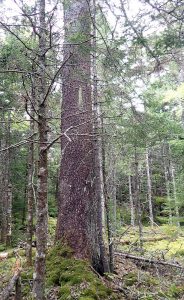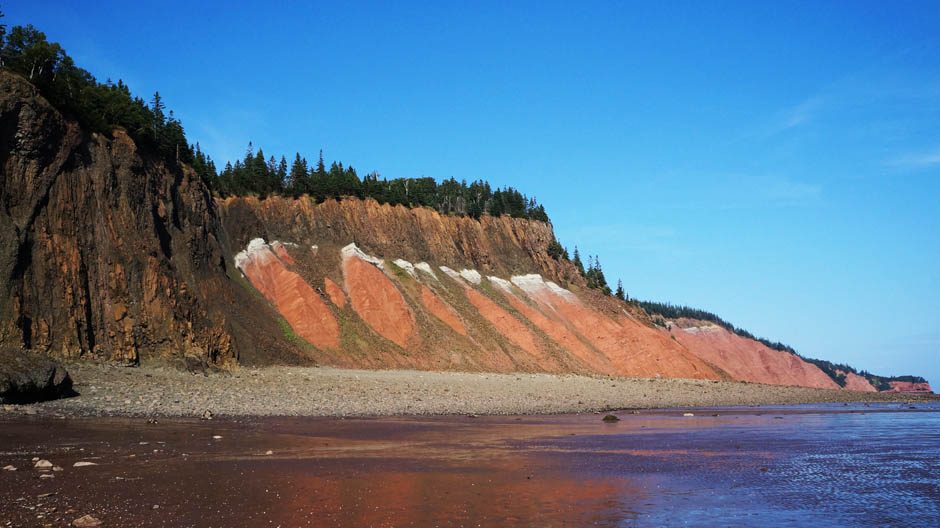A few quotes that say a lot
“A law written on a piece of paper make s it illegal to kill red-eyed vireos. Yet a bull dozer, legally pushing its way through the forest to build a new road, crushes a tree, and four fledgling vireos that would have been able to fly within a week are lost in the pile of earth and twisted roots.“
Tony Duke 1981 in Wildlife Protection Conservation (NS Department of Lands and Forests) . What does it take to protect an animal?
 “You can’t grow a 150 year-old tree in 50 years.”
“You can’t grow a 150 year-old tree in 50 years.”
Comment by an elder forester when the Stanfield government held hearings in Cumberland Co. in the early 1960s to promote its plans to clearcut in support of a new pulp mill planned for Pictou and told woods people, “Now you will be able harvest every 50 years”. (Source: an elder from Parrsboro area).
“Nova Scotia Power has an obligation to its ratepayers to get wood fibre as cheaply as possible. The cheapest way is to clear land, not selectively harvest to improve the lot for the future.”
Alan Eddy, Associate Deputy Minister of NSDNR and former senior forester with Nova Scotia Power after acknowledging that land was being cleared to feed the biomass boiler at Pt. Tupper, cited in the CH Jan 9, 2015.
“I remain unconvinced that clearcutting is the best option for the majority of our forest types, especially in western Nova Scotia. After studying the lessons of history and the experience of the United States, Scandinavia and Germany, I am reasonably certain that clearcutting as commonly practised here offers little or no economic advantage over partial cutting systems when all costs are added in and, furthermore, that over the long run it is ecologically unsound. Yet clearcutting with planting is the chief method practiced in Nova Scotia today. Down the road I think we will pay for this in decreasing water quality.”
Ralph S. Johnson, 1986. In the Epilogue to his book Forests of Nova Scotia, published by NS Dept of Lands and Forests.
“You cannot separate the people from the land, it is who we are.”
Mi’kmaq poet and scholar Shalan Joudry on Connecting to Wapane’kati, Oct 21, 2016.
“Papermaking in the northeast of North America has run the gamut. It’s no longer economic without serious concessions from the people and our forest.”
Tom Miller, Race to the Bottom Letter Apr 7, 2016
“A new harvest tracking system will enable government to monitor and report on the progress towards the target to reduce clear-cutting to no more than 50 per cent of our harvest over the five-year period after the implementation which will take us into 2016. ”
Charlie Parker, Minister of Natural Resources, Hansard, April 19, 2012
“Successive governments, whether PCs, Liberals or NDPs, have watered down forest conservation legislation to make (it) meaningless as effective tools for forest conservation. (It is) only used to placate the general public into letting them think something useful is being done.”
Glyn Bissix, Acadia Univ. prof. In CH June 24, 2012 Forestry experts seek strong rules, local owners for N.S. woodlands
“Nobody should question my department’s commitment to managing the forestry…we understand what’s needed… we know what valuable resources it is… it has been contributing for 400 years and we want it to contribute for another 400 years.”
NSDNR Minister Lloyd Hines on CBC Sep 10, 2016.
“[In those days] We cut the rest and leave the best…today they cut the best and leave the rest.”
Richard Countway (View Post)
“In my opinion, the forests [of Nova Scotia] are not being pushed too hard, especially the regulated Crown forests”
Prof Peter Duinker before a Senate Committee, Oct 3, 2017
Forestry wasn’t a science, then, of course. It wasn’t even a word in their language. The big pines were there to be raped, just as the moose and caribou were there to butcher for their logging camps in the winters. The great slabs they cut off the logs with their wasteful old fashioned saws in the mills were just something to burn up or dump into the river with the sawdust; and if all this trash fouling the clean water and cluttering the river bottom had a bad effect on the salmon run, who cared about that either? They had rambled over the Seaforth water-shed as feckless as beavers in a poplar patch. Tomorrow? That’s someone else’s day. Come on boys, let the daylight into this clump. Get this big stuff down and hustle off to the next before Tom, Dick or Harry gets an ax in it. Timberrrr! Never mind the slash. Let it lie. Who cares about the dead brush? Fire’s just a nuisance anyway. Let the next rain put it out. Plenty more further up the river. Get a move on
– Thomas Head Raddall, in The Wings of Night, p. 74 (1956) Thx to NR for passing that on
I tried to find online text for that work, could not, but found a fascinating interview with Raddall, see “HELPING TO TURN THE TIDE“: AN INTERVIEW WITH THOMAS H. RADDALL
THR: It was a relief from desk work to get out in the woods, and I always enjoyed hunting and fishing, and exploring I enjoyed most. I never hunted or killed anything just for the fun of killing. I killed for the pot, and when that ceased to be necessary, I gave up hunting. But it wasn’t just the hunting, the catching trout and that kind of thing. It was being in the woods, getting off the road and being in this green world that interested me and got me away from my sea outlook. I came to this part of the country, to this job in the woods, intending to stay not more than twelve months. I wanted to get back to the city.
At first I didn’t dare step off the road without a guide, but then I realized that navigating in the woods was no different from navigating on the sea. If you had a map and a good compass and a good pair of legs, you could go anywhere anytime. Once I discovered that, the woods were mine. And then I found a vast relief from my labours at my desk–just to get back in the woods as far as I possibly could.
And, of course, it was all grist to the mill. You have to retain your interest in humanity, and you meet all kinds in the woods: the Indians, the lumberjacks, the river drivers, all those people. You talked to them on their own ground and then incidentally you would pick up stories from actual life or the gist of a story. Quite often you would find the beginning of a story, and you’d have to fit it with a middle and an end, and sometimes all you would have would be the ends that you had to bring about. But you find these in actual life, and I found them wherever I went, as far as that goes, on the coast, in the fishing villages, on the river, and in the woods.
“It is instructive that the Cabot Links golf course (ranked No. 43 in the world outside the U.S.) is built on an abandoned coal mine. Building its sister course, Cabot Cliffs (ranked No. 9), required a lot of trees to be knocked down. Most of the discomfited birds, being mobile, will have found new habitat in the plentiful neighbouring forests.”
Bill Black in Let’s stop hugging trees, start embracing industry (Chronicle Herald, Jan 20, 2018)
